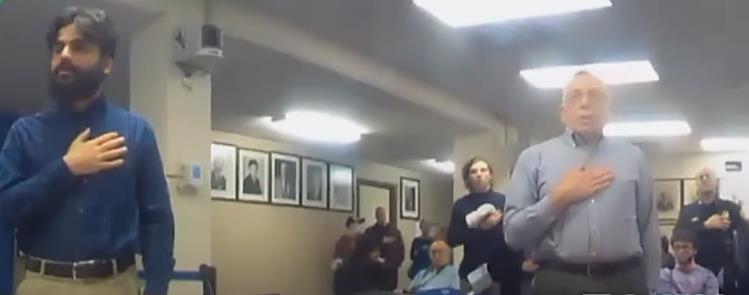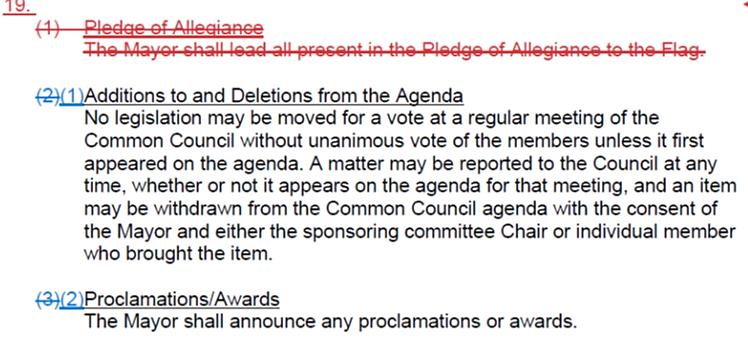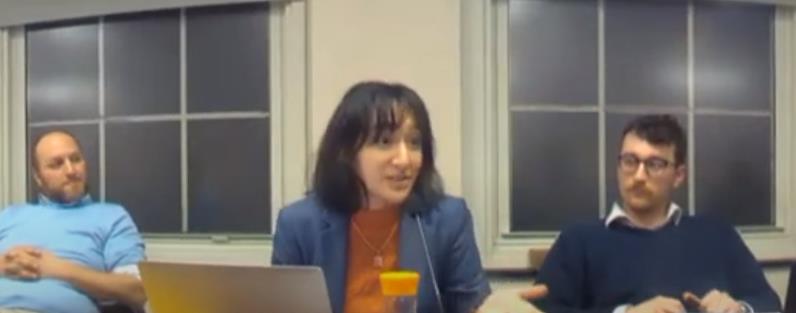Analysis & Commentary by Robert Lynch; February 8, 2024
The Pledge of Allegiance died at Ithaca’s Common Council Wednesday night. I was there only hours before it took its final breath. No doubt, a few in the room had wished I’d not been there. They’d rather I’d declined to provide patriotic reverence any final comfort. To a few of the City of Ithaca leaders whom voters recently elected, it would have been far better that words of national pride and loyalty had departed quietly; expired in the darkness without friends around and absent any fitting eulogy.

Had I not chosen to attend, my detractors would have gotten their wish. I’m glad that I was there, that I led in what was likely the Pledge of Allegiance’s final recitation at City Hall. I only regret that no one else—like someone who actually lived in the City—had stepped up first and beat me to the punch.
We’re told Common Council meetings haven’t employed the Pledge of Allegiance for a while now. It’s supposed to be recited, yet conveniently always gets overlooked. No one seems to care. To wedge-in what I needed to say, I employed privilege-of-the-floor as my chosen—and my only—procedural tool. Twelve people spoke to Council before I did. The others had other things to talk about. I had but one topic. It mattered most:
“Good Evening. Robert Lynch; I’m a Councilperson in the Town of Enfield. I appreciate being at your meeting tonight. I would like to start by inviting anybody in this room who is willing and able to stand for the Pledge of Allegiance:
[I stood up, put hand on heart, and pledged allegiance to the Flag positioned at the front of the room. Approximately half of Common Council, including Mayor Robert Cantelmo, joined me in the recitation. The others remained seated. Five or six persons in the visitors’ gallery behind me also joined and recited the words. I returned to my speaker’s chair and continued my message:]
“And I said that. Some people may say, ‘Oh, that’s performative.’ No, it’s not. It’s demonstrative. It demonstrates how short the Pledge of Allegiance is and also how important it is to some people in this community who care about tradition, who care about patriotism, and care about setting a good example for the county seat of Tompkins County.
“This is the Number One municipality in this county, and it does set a standard. Tompkins County Government, they start the meetings with the Pledge of Allegiance. I attended my first Common Council meeting back in 1970, as a reporter. And we always started the meeting with the Pledge of Allegiance. It gives a good framework to the meeting, and it makes a good point. And I hope when you consider revising your agenda in the course of setting your new Rules of Procedure tonight that you consider keeping the Pledge a part of it….”
A few persons behind me in the gallery clapped as I concluded. I sensed some reluctance to their revealing their true beliefs. And all the time I sat in Council Chambers that night, a sensed a pungent aroma of political discomfort pervading the place, at least it did for me. This is not Enfield, I thought. This is not our Town Board, not even during some of our worst moments. This may not even be the United States of America. This, to me, is somewhere else, a foreign land not my home; certainly not the Ithaca I’d grown to love for now a half-century; a town liberal; yet still sane. Is this the new reality that Ithaca and its City government has now become? If so, somebody, please change it.

I excused myself to attend a meeting back in Enfield, one for which I was already a half-hour late. But when I returned home from that Planning Board session, I captured Common Council’s closing minutes on City Hall’s web stream. The decision I cared most about I found far too predictable. Indeed it was worse than I had feared.
Nearing the end of its clogged, four-hour agenda, Common Council took a mere twenty seconds a to cast aside the Pledge of Allegiance with amazing dispatch and profound disregard. As it did, City lawmakers also ushered in new, sweeping Rules of Procedure, and did so without a wisp of critical analysis or reasoned dissent. If you hadn’t known what was happening, you would have missed its true impact. First, one Alderperson moved; another seconded; zero discussion; and a unanimous vote. And with that, the Pledge of Allegiance was gone… and a whole lot of other things changed too.
True, Common Council hammered out many of the procedural nuts and bolts at a laborious working session two weeks earlier. When they did, members toyed with finding a fitting substitute for the Pledge. They couldn’t find one, and so they simply gave up.
The meeting’s video replay shows Alderpersons Margaret Fabrizio, Patrick Kuehl, Clyde Lederman, and Pierre Saint-Perez joining Mayor Cantelmo and me in honoring Old Glory. That’s it. Members Phoebe Brown, Kayla Matos, Tiffany Kumar, Ducson Nguyen, and David Shapiro remained in their seats. Kris Haines-Sharp, though mostly off-camera, appeared to be seated as well.

No other members of the public spoke to the Pledge of Allegiance that night. But after public comments had ended, three members of Council took their turns. They included both of Council’s African-American members, Phoebe Brown and Kayla Matos. They spoke to me, though in my absence. Their words were not kind:
Phoebe Brown: “(To) the Gentleman from the Town of Enfield: How dare you! How dare you. I think of myself as a 6-year old, 5-year old going to school, saying the Pledge of Allegiance, and it had been built in me that this was something that I’d do that I would start to cry, saying the Pledge of Allegiance, until I became older and understood what was being done to me, what was happening to me, that I was being forced to believe in something that didn’t say nothing about me. When I walked out of my school and back into my house and the conditions that we lived in with something that tells us how much they care for us and how much—what the Pledge of Allegiance… what it’s done to people who look like me; come on: How dare you; How dare you. You give people a chance to say what works for them.”
Kayla Matos: “I would like to address the Council member from Enfield as to how it is—how not saying or reciting the Pledge of Allegiance is unpatriotic. Personally, being a person of color and being with the (unintelligible) systems that has literally destroyed and stoked down my people, I don’t think that it is fair to say that our country has devoted themselves… or any of their policies to people of color who have literally built the country that we are on. That’s why we’re having conversations now about reparations and things. And also talking about traditions; this country is also built on traditions that aren’t working (unintelligible) for my people of color. The reason I ran for the seat and I won this seat was because I’m trying to be a voice and an advocate for those people, that I’m trying to tear down these systems that don’t work for these people and rebuild them. And the best way to do that is politically in the government.”
Tiffany Kumar (a Cornell student): “On the subject of patriotism: Dr. Martin Luther King, himself, who said in the Letter from the Birmingham Jail; he argued that we have a patriotic duty to stand in opposition to oppressive institutions and policies, especially ones that are created in times when not everybody had an equal say in them. But that is the best way to honor the laws and traditions we have in this country that are democratic and just, like Black History Month.”

I will leave it to others to categorize the agendas, parse the logic, and ascertain the motivations underpinning the objections expressed by my three Common Council critics that night. Yet I find it hard to equate perceived grievance or progressive guilt with disavowing the banner of the nation that accords us the freedom to right our society’s wrongs and lift up those oppressed.
Moreover, I never recall the Rev. Dr. Martin Luther King Jr. having refused to pledge to the flag. And I believe our nation’s highest-currently elected African-American leader, Vice President Kamala Harris, still places hand over heart. So rejecting the nation’s symbol because of our country’s flawed past and imperfect present, for me, fails to register. Beyond that, others may judge.
But win or lose, I did something good Wednesday night. I challenged group-think. I held open for public examination a lockstep, politically-fashionable ultra-liberal ideology and placed it in contrast with the traditional, mainstream patriotic values that I find most people embrace, except, perhaps, in the bowels of Ithaca. Had I not been in Council Chambers, nobody would have heard my point of view, nor Phoebe Brown’s, for that matter.
When personal opinions go unchallenged, one never learns, one never grows. Ithaca politics, I fear, has traveled to Berkeley and maybe beyond. I harbored no illusions Wednesday night. Common Council was going to expel the Pledge of Allegiance from its meetings. But the random applause a few people provided informs me that Council’s view is not everyone’s view.
Ithaca, you’re more or less on your own, now. I likely won’t revisit another Common Council meeting for a while. I did what was needed, but I find the air down there not to my liking. I’ll stay in Enfield, instead. Yes, we in Enfield may say the Pledge of Allegiance only by request. But at least we have it at the ready. I intend to use it, more so now because Ithaca no longer does.
###

